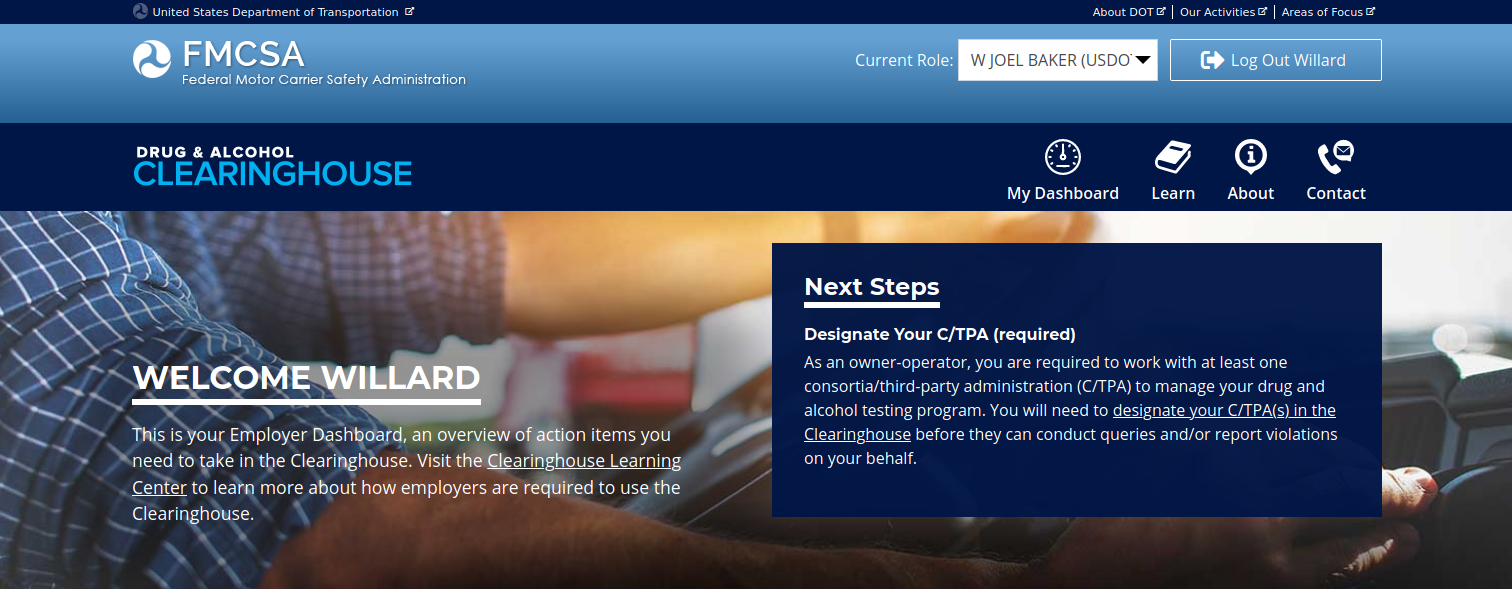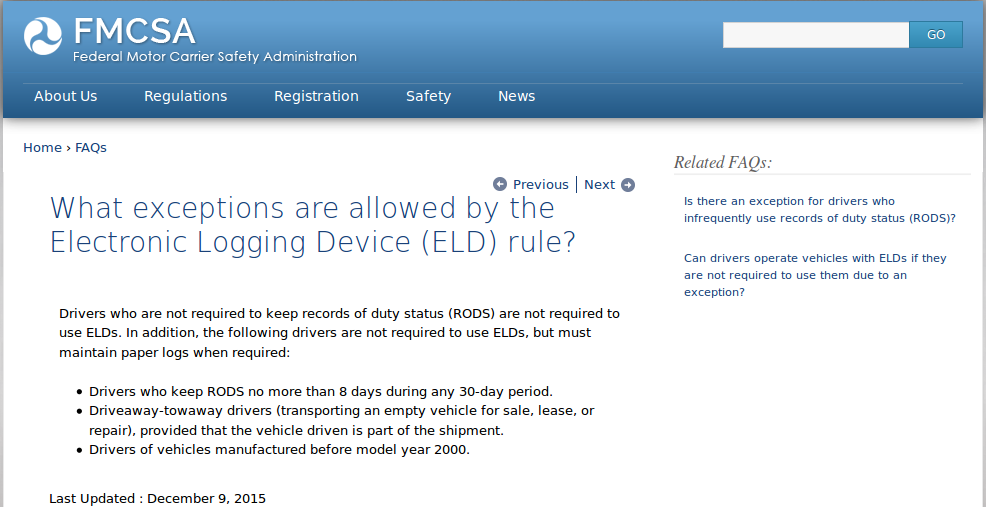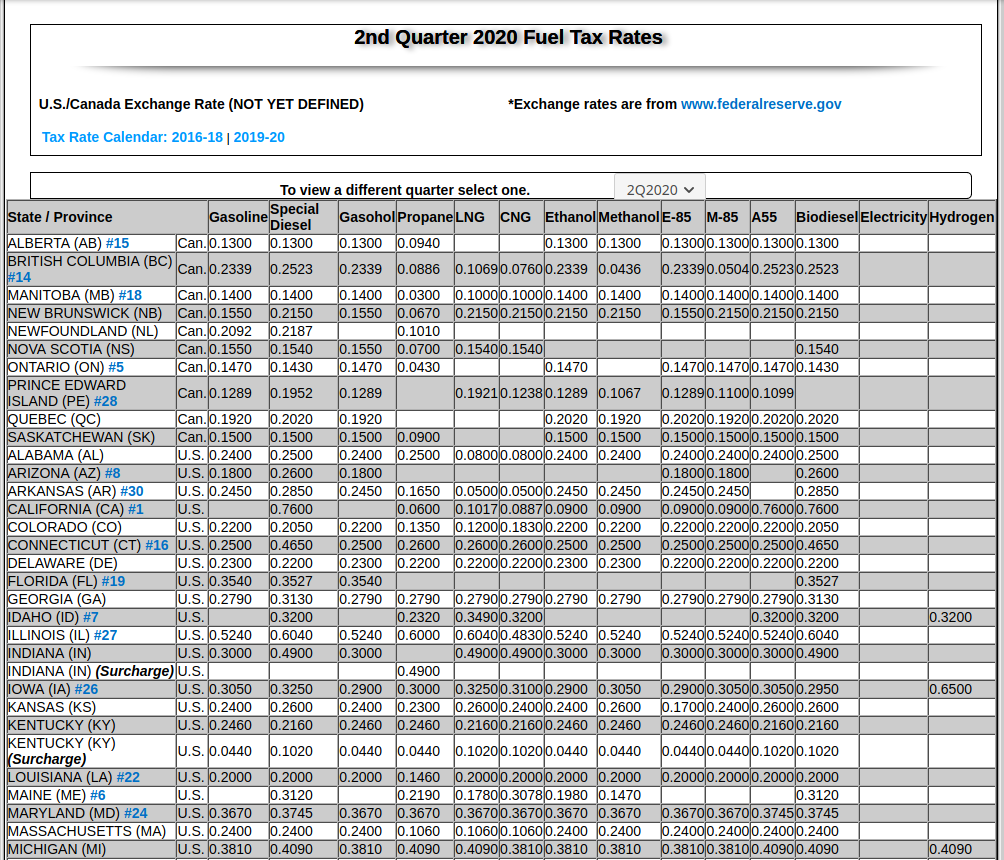Deciding
to get your own FMCSA operating authority and DOT number is a big
step. Most use agents to help them get started. Unfortunately they
cost a lot of money. I’m going to share with you all the different
regulating agencies and how to contact them. By doing so, I’m giving
you the ability to get set up with all of them so you can avoid
paying an agent more than necessary. What better way to start your
business than by saving money and learning compliancy requirements at
the same time! Here are the basic Federal requirements (there are
more and I’ll discuss them soon).
1.
FMCSA Operating
Authority “MC”
“FF” or “MX” number
2.
Department of Transportation (DOT) number
3.
Commercial Insurance
4.
*Unified Carrier Registration (UCR)
5.
*International Fuel Tax Agreement (IFTA)
6.
*International Registration Plan (IRP)
7.
BOC-3
*
These 3 are frequently done at the same time at your state or
jurisdiction office. In most cases you can apply, pay and receive all
of them in person and on the same day. It is wise to verify in
advance what types of payments your state or jurisdiction will accept
as they are all different.
FMCSA
Operating
Authority “MC”
number
The
FMCSA website states…
“In
general, companies that do the following are required to have
interstate Operating Authority (MC number) in addition to a DOT
number:
Operate
as for-hire carriers (for a fee or other compensation)”
Since
the one time fee is only $300.00, I recommend every “For-Hire”
carrier to not take any chances or run the risk of operating without
having their MC (Motor Carrier) number. It
is a fairly simple process and can be done through the SaferSys
website (an FMCSA website).
Department
of Transportation (DOT) number
I
have never seen a truck or met a truck owner that wasn’t required to
have a USDOT number. The FMCSA’s website states…
“You
are required to obtain a USDOT number if you have a vehicle that:
Is
used in transporting material found by the Secretary of
Transportation to be hazardous and transported in a quantity
requiring placarding (whether interstate or intrastate).
OR
Has
a gross vehicle weight rating or gross combination weight rating, or
gross vehicle weight or gross combination weight, of 4,536 kg (10,001
pounds) or more, whichever is greater”
and
goes on to state…
“AND
is involved in Interstate commerce:
Trade,
traffic, or transportation in the United States—
Between
a place in a State and a place outside of such State (including a
place outside of the United States);
Between
two places in a State through another State or a place outside of the
United States; or
Between
two places in a State as part of trade, traffic, or transportation
originating or terminating outside the State or the United States.
You
are required by FMCSA to obtain USDOT Number and comply with the
Federal Regulations.”
The
FMCSA concludes with…
“Apart
from federal regulations, some states require commercial motor
vehicle registrants to obtain a USDOT Number. These
states include:
Alabama,
Alaska, Arizona, Colorado, Connecticut, Florida, Georgia, Indiana,
Iowa, Kansas, Kentucky, Maine, Maryland, Michigan, Minnesota,
Missouri, Montana, New Jersey, New York, Nebraska, North Carolina,
Ohio, Oklahoma, Oregon, Pennsylvania, South Carolina, Tennessee,
Texas, Utah, Washington, West Virginia, Wisconsin, Wyoming”
Obtaining
a USDOT number is free. The
FMCSA made it convenient to apply for a USDOT number at the same time
you apply for a MC number
by
using
the SaferSys website. You
will be required to complete and submit the MCS -150 form which
defines your business to the USDOT before
they will issue you a USDOT number.
Commercial
Insurance
Once
you have applied for your FMCSA operating authority you will need
commercial insurance before your MC number is ready to be used
legally. Your insurance company is required to notify the FMCSA once
you have purchased your insurance. This process of the insurance
company notifying the FMCSA of your policy and the FMCSA updating
your MC number with the insurance does take time. Your insurance
agent and/or company will be able to provide you with the coverage
requirements from the FMCSA.
Unified
Carrier Registration (UCR)
The
Unified
Carrier Registration (UCR) is
a registration based on the number of vehicles (trucks) you operate.
You can complete your UCR either through the UCR website or many
times through your state you operate from. UCR
is paid annually.
International
Fuel Tax Agreement (IFTA)
IFTA
accounts are free and depending on your state or jurisdiction you may
or may not pay for the IFTA stickers that are required for each truck
in your fleet. I normally start my IFTA account and receive my
stickers on the same day I pay for and receive my IRP plates (which I
will discuss next). Renewal each year is typically done either on a
state or jurisdiction website or by mail. Filing
your IFTA taxes is a quarterly requirement.
International
Registration Plan (IRP)
The
International
Registration Plan (IRP) is
the registration and license plates for all your vehicles. It
is an apportioned registration. Meaning you will pay a portion of
each states registration fee based on the percentage of miles you
operate in each state or jurisdiction. When you apply for your first
IRP you will be required to use “estimated miles.” This does not
mean you get to estimate your miles. The estimated miles are provided
to you by your state or jurisdiction. In most cases it will be your
responsibility
to put the correct estimated miles for each state or jurisdiction in
the correct field. If it is not correct the IRP official (in most
cases) will not fix the mistakes but rather give it back to you and
have you fix them. That means going back to the end of the line. I
failed to get the correct estimated mileage one time and it took me 3
hours to get back to the IRP official so I could pay my bill and
complete my registration.
BOC-3
The
BOC-3 is one of the most overlooked requirements by the FMCSA. The
reason is simple. There is not a “check and balance” or
verification process before being allowed to operate using your new
authority. The purpose of the BOC-3 is to provide the FMCSA with a
list of agents from the states or jurisdictions you operate in that
will receive legal documents. The FMCSA describes it’s purpose this
way…
“A
process agent is a representative upon whom court papers may be
served in any proceeding brought against a motor carrier, broker, or
freight forwarder. Every motor carrier (of property or passengers)
shall make a designation for each State in which it is authorized to
operate and for each State traversed during such operations.”
Now
I don’t normally recommend using an agent for much of anything.
However, in this case it is best. Otherwise you will need to locate
representatives for every state or jurisdiction and continually
verify that the representative is still in business. Personally, I
have enough to do without calling 50+ representatives every week or 2
to verify they are still in business. Through an agent, a BOC-3 will
cost you a 1 time fee of normally no more than $50.00. A list of
agents is provided by the FMCSA on their website.
Deciding
to get your own FMCSA operating authority and DOT number is a big
step. Most use agents to help them get started. Unfortunately they
cost a lot of money. I’m going to share with you all the different
regulating agencies and how to contact them. By doing so, I’m giving
you the ability to get set up with all of them so you can avoid
paying an agent more than necessary. What better way to start your
business than by saving money and learning compliancy requirements at
the same time! Here are the basic Federal requirements (there are
more and I’ll discuss them soon).
1.
FMCSA Operating
Authority “MC”
“FF” or “MX” number
2.
Department of Transportation (DOT) number
3.
Commercial Insurance
4.
*Unified Carrier Registration (UCR)
5.
*International Fuel Tax Agreement (IFTA)
6.
*International Registration Plan (IRP)
7.
BOC-3
*
These 3 are frequently done at the same time at your state or
jurisdiction office. In most cases you can apply, pay and receive all
of them in person and on the same day. It is wise to verify in
advance what types of payments your state or jurisdiction will accept
as they are all different.
FMCSA
Operating
Authority “MC”
number
The
FMCSA website states…
“In
general, companies that do the following are required to have
interstate Operating Authority (MC number) in addition to a DOT
number:
Operate
as for-hire carriers (for a fee or other compensation)”
Since
the one time fee is only $300.00, I recommend every “For-Hire”
carrier to not take any chances or run the risk of operating without
having their MC (Motor Carrier) number. It
is a fairly simple process and can be done through the SaferSys
website (an FMCSA website).
Department
of Transportation (DOT) number
I
have never seen a truck or met a truck owner that wasn’t required to
have a USDOT number. The FMCSA’s website states…
“You
are required to obtain a USDOT number if you have a vehicle that:
Is
used in transporting material found by the Secretary of
Transportation to be hazardous and transported in a quantity
requiring placarding (whether interstate or intrastate).
OR
Has
a gross vehicle weight rating or gross combination weight rating, or
gross vehicle weight or gross combination weight, of 4,536 kg (10,001
pounds) or more, whichever is greater”
and
goes on to state…
“AND
is involved in Interstate commerce:
Trade,
traffic, or transportation in the United States—
Between
a place in a State and a place outside of such State (including a
place outside of the United States);
Between
two places in a State through another State or a place outside of the
United States; or
Between
two places in a State as part of trade, traffic, or transportation
originating or terminating outside the State or the United States.
You
are required by FMCSA to obtain USDOT Number and comply with the
Federal Regulations.”
The
FMCSA concludes with…
“Apart
from federal regulations, some states require commercial motor
vehicle registrants to obtain a USDOT Number. These
states include:
Alabama,
Alaska, Arizona, Colorado, Connecticut, Florida, Georgia, Indiana,
Iowa, Kansas, Kentucky, Maine, Maryland, Michigan, Minnesota,
Missouri, Montana, New Jersey, New York, Nebraska, North Carolina,
Ohio, Oklahoma, Oregon, Pennsylvania, South Carolina, Tennessee,
Texas, Utah, Washington, West Virginia, Wisconsin, Wyoming”
Obtaining
a USDOT number is free. The
FMCSA made it convenient to apply for a USDOT number at the same time
you apply for a MC number
by
using
the SaferSys website. You
will be required to complete and submit the MCS -150 form which
defines your business to the USDOT before
they will issue you a USDOT number.
Commercial
Insurance
Once
you have applied for your FMCSA operating authority you will need
commercial insurance before your MC number is ready to be used
legally. Your insurance company is required to notify the FMCSA once
you have purchased your insurance. This process of the insurance
company notifying the FMCSA of your policy and the FMCSA updating
your MC number with the insurance does take time. Your insurance
agent and/or company will be able to provide you with the coverage
requirements from the FMCSA.
Unified
Carrier Registration (UCR)
The
Unified
Carrier Registration (UCR) is
a registration based on the number of vehicles (trucks) you operate.
You can complete your UCR either through the UCR website or many
times through your state you operate from. UCR
is paid annually.
International
Fuel Tax Agreement (IFTA)
IFTA
accounts are free and depending on your state or jurisdiction you may
or may not pay for the IFTA stickers that are required for each truck
in your fleet. I normally start my IFTA account and receive my
stickers on the same day I pay for and receive my IRP plates (which I
will discuss next). Renewal each year is typically done either on a
state or jurisdiction website or by mail. Filing
your IFTA taxes is a quarterly requirement.
International
Registration Plan (IRP)
The
International
Registration Plan (IRP) is
the registration and license plates for all your vehicles. It
is an apportioned registration. Meaning you will pay a portion of
each states registration fee based on the percentage of miles you
operate in each state or jurisdiction. When you apply for your first
IRP you will be required to use “estimated miles.” This does not
mean you get to estimate your miles. The estimated miles are provided
to you by your state or jurisdiction. In most cases it will be your
responsibility
to put the correct estimated miles for each state or jurisdiction in
the correct field. If it is not correct the IRP official (in most
cases) will not fix the mistakes but rather give it back to you and
have you fix them. That means going back to the end of the line. I
failed to get the correct estimated mileage one time and it took me 3
hours to get back to the IRP official so I could pay my bill and
complete my registration.
BOC-3
The
BOC-3 is one of the most overlooked requirements by the FMCSA. The
reason is simple. There is not a “check and balance” or
verification process before being allowed to operate using your new
authority. The purpose of the BOC-3 is to provide the FMCSA with a
list of agents from the states or jurisdictions you operate in that
will receive legal documents. The FMCSA describes it’s purpose this
way…
“A
process agent is a representative upon whom court papers may be
served in any proceeding brought against a motor carrier, broker, or
freight forwarder. Every motor carrier (of property or passengers)
shall make a designation for each State in which it is authorized to
operate and for each State traversed during such operations.”
Now
I don’t normally recommend using an agent for much of anything.
However, in this case it is best. Otherwise you will need to locate
representatives for every state or jurisdiction and continually
verify that the representative is still in business. Personally, I
have enough to do without calling 50+ representatives every week or 2
to verify they are still in business. Through an agent, a BOC-3 will
cost you a 1 time fee of normally no more than $50.00. A list of
agents is provided by the FMCSA on their website.
Aside
from the cost of your insurance and IRP, the entire cost to you
should not exceed around $400.00. Many agents charge thousands of
dollars. Since I’m always looking to save money and improve my
profits, it only makes sense for me to spend a little time educating
myself, complete the applications or filings, and saving money at the
same time. If
you want to learn more check out the category Business of Trucking.
Aside from the cost of your insurance and IRP, the entire cost to you should not exceed around $400.00. Many agents charge thousands of dollars. Since I’m always looking to save money and improve my profits, it only makes sense for me to spend a little time educating myself, complete the applications or filings, and saving money at the same time. If you want to learn more check out the category Business of Trucking.




